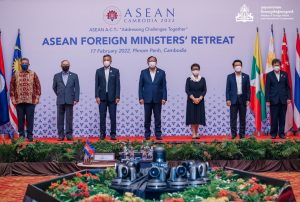ASEAN unity has been sorely tested in recent years by issues like the South China Sea disputes, regional power rivalry between China and the Western-led Quad alliance, Myanmar’s military treatment of its Rohingya population, and last year’s coup d’etat.
Bureaucrats too often struggle to produce a unified front and instead issue lame, routine statements in response to one crisis after another that are watered-down to meet the self-serving diplomatic demands of each member of the 10-nation bloc.
That was evident in the ASEAN response to Russia’s invasion of Ukraine, wherein the bloc did express “deep concern” for a great crisis in just two paragraphs while side-stepping any criticism of Moscow by not mentioning Russia or what it has actually done to its neighbor.
Which is to say, standard fare for countries preferring to say nothing and let a toothless trading bloc do the diplomatic work for them. However, some individual leaders have changed tack over the plight of Ukraine and are steering their countries accordingly.
Singapore condemned the invasion and broke with ASEAN by announcing sanctions in line with the United Nations. Indonesia and ASEAN aspirant Timor-Leste were also loud in condemning the invasion.
The surprise was Cambodia. Prime Minister Hun Sen issued a lengthy statement, reading in part: “In my personal opinion, the Russian forces may not be able to overthrow Ukraine through the use of military means and it is the same for Ukraine.”
“This may not be possible even if Russia occupies the whole Ukraine’s territory and murders or arrests the Ukraine’s president. Will the Ukrainians remain silent? Look at some countries like Iraq, Syria, Libya. Has war in those countries ended?”
That was most unusual given Cambodia’s position as this year’s chair of ASEAN and Russia’s influence across Indochina during the latter half of the Cold War when it backed Vietnamese and Cambodian forces who eventually ousted Pol Pot and his Khmer Rouge from power.
Myanmar, however, bucked the trend and further isolated itself by declaring the invasion was “justified for the sustainability of their country’s sovereignty” and offered proof that Russia, its chief ally, arms supplier and lone supportive voice on the U.N. Security Council, was a genuine world power. Hardly.
Myanmar’s reaction had more to do with its isolation in ASEAN and its inability to garner any international respect after ceasefires were repeatedly shattered, even as this year’s ASEAN chair tried to negotiate some kind of peace amid the carnage that followed last year’s coup.
Other ASEAN countries were tame, reflecting the bloc’s official statement which coincided with the release of the 2022 annual index on political rights by the U.S.-based group Freedom House.
In a repeat of previous years, not one ASEAN country was ranked as “free” while Singapore, Malaysia, the Philippines, and Indonesia were among those considered “partly free.” Myanmar, Laos, Cambodia, Vietnam, Brunei, and Thailand were all ranked as “not free.”
Timor-Leste was the only country in Southeast Asia to be ranked as “free.” It’s a status which deserves consideration among ASEAN members who might decide whether or not to admit Timor-Leste into the bloc before this year is out.
Obstruction to admitting Timor-Leste is partly based on cost, as it will need help in meeting the financial obligations that come with membership, and fears that it is getting too close to China and risks becoming another voice for Beijing in the region. Neither issue is insurmountable.
ASEAN could also consider expelling Myanmar, at least until free and fair elections have been held. It has been suggested before. Naypyidaw remains a major embarrassment and its removal would potentially offset some of the costs of admitting Dili.
That, combined with the ability of Southeast Asian leaders to speak honestly and publicly about issues that matter, would dramatically reshape the region for rapidly changing times, leaving ASEAN to focus on its role as a trading bloc, one area of international diplomacy in which the group has performed well.
































